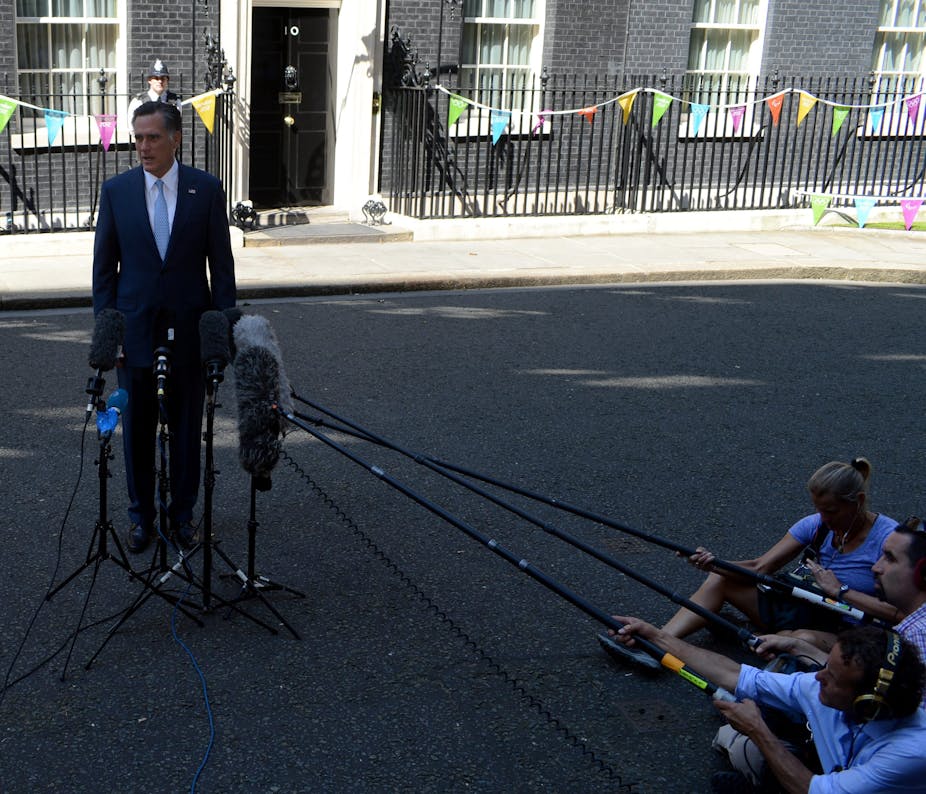On its trip abroad, the Mitt Romney campaign would have done well to heed the advice US presidential candidates are given in a selecting a VP: “First, do no harm.” Upon arrival in the United Kingdom, however, Romney seemed to quickly discard this adage.
First, a campaign advisor used some racially inflammatory language, implying that Romney is better suited to preserving the critical US-UK alliance. “We are part of an Anglo-Saxon heritage,” the unnamed staffer remarked, “and [Romney] feels that the special relationship is special.”
Race has been an elephant in the room throughout this year’s presidential campaign. Think of Newt Gingrich referring to US President Barack Obama as “the food stamp president” or Mitt Romney responding to boos at his National Association for the Advancement of Colored People speech by saying “if they want more stuff from the government tell them to go vote for the other guy.”
Of course, the campaign rhetoric from both sides has often been caustic and there’s no clear line separating strident but acceptable attacks from more blatant race-baiting. What made the “Anglo-Saxon” remark striking though is just how obvious the reference to race was.
There’s no indication that the staffer specifically referred to Obama or his race when making these comments. Nevertheless, the description of American heritage as “Anglo Saxon” is damaging in itself. The Republican Party has generally displayed a tone-deafness when it comes to minority voters and it’s going to need to move away from this kind of rhetoric if it wants to remain electorally competitive in an increasingly multicultural nation.
On the heels of this mistake, Romney made a gaffe of his own when asked whether London was ready to host the Olympics. An unwritten rule of American foreign relations is that politicians shouldn’t be overly critical of the US government while overseas. However, the Republican nominee decided that the same cordiality isn’t necessary when talking about other people’s governments and cities. When asked about London’s preparation for the Games, he told NBC news presenter Brian Williams: “You know, it’s hard to know just how well it will turn out.” Romney went on to explain that much of what he’d heard so far has been “disconcerting.”
In the grand scheme this incident is quite trivial. The comment might rile up the Brits a bit but will be largely ignored by Americans and then forgotten entirely when the next story de jour appears. Still, it was ironic given the purpose of Romney’s trip abroad.
Romney has consistently accused the President of alienating the country’s closet allies and this trip was subtly choreographed to highlight these failings. He visited the United Kingdom, where relations with the US remain strong, but not nearly as close as during the Bush–Blair years.
Next, it’s on to Israel, where Romney’s close friendship with Prime Minister Benjamin Netanyahu stands in contrast with Obama’s often chilly relationship with the Israeli leader. Finally, the trip will conclude in Poland. The Obama administration has had a few notable tiffs with the Poles, including a cancellation of his predecessor George W. Bush’s proposal to build a missile defence system in the country.
However, it’s a lot harder to makes this kind of narrative resonate when you irritate the country’s key figures within a day of arrival. The mayor of London publicly chided Romney and British PM David Cameron remarked, “It’s easier if you hold an Olympic Games in the middle of nowhere” — a reference to Romney’s role in organising the 2002 Winter Olympics in Salt Lake City.
This is the time in the election when a candidate needs to start looking presidential — as someone voters can imagine in the White House. Romney’s trip was supposed to be an important step in this process, allowing him the opportunity to meet key world leaders as a representative of America, and not simply the Republican Party.
Instead, he’s coming off looking more like the clumsy and inexperienced leader that he accuses Obama of being.

